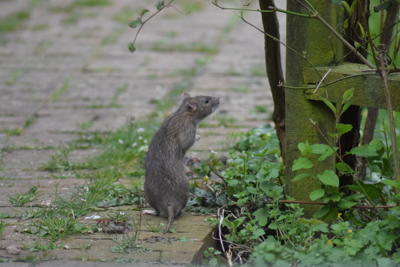In a city long plagued by rats, Chicago’s Wicker Park and Bucktown neighborhoods are pioneering a novel, humane approach to pest control: rat birth control.
This spring, Special Service Area No. 33 (SSA #33), administered by the Wicker Park Bucktown Chamber of Commerce, launched a pilot program deploying contraceptive-laced bait boxes in local alleys. The initiative aims to curb the city’s rat population by targeting reproduction rather than resorting to traditional poisons .
The program utilizes Evolve, a product developed by Arizona-based SenesTech. Evolve contains cottonseed oil, which renders both male and female rats infertile when consumed regularly. Unlike poisons, this method poses minimal risk to pets and other wildlife, aligning with a growing demand for environmentally friendly pest control solutions .
Bryan DiMenna, SenesTech’s vice president of sales, highlighted the product’s safety profile, noting that a pet would need to consume its body weight in the bait to experience any effects, which are non-lethal, according to Chicago Sun-Times. The Environmental Protection Agency classifies Evolve as a “low-risk pesticide,” further supporting its use in urban settings.
SSA #33 has made Evolve accessible to residents and business owners at a wholesale rate of $130 for a 12-pound supply. Community members can purchase the product at designated events or through the chamber’s website, with pickups available at the office located at 1414 N. Ashland Ave .
The pilot program has garnered positive feedback from the community, with residents appreciating the shift toward a more humane and sustainable method of rodent control. The success of this initiative has sparked interest in other Chicago neighborhoods, such as Lincoln Park, which plans to implement a similar program this summer .
Chicago’s persistent rat problem, underscored by its designation as “America’s rattiest city” for ten consecutive years by Orkin Pest Control, has necessitated innovative solutions. By focusing on reproductive control, the city aims to reduce the rat population over time without the collateral damage associated with poisons. This approach not only addresses public health concerns but also reflects a broader commitment to humane and ecologically responsible urban management.
As the program progresses, ongoing monitoring and community engagement will be crucial in assessing its effectiveness and scalability. If successful, Chicago’s rat birth control initiative could serve as a model for other urban centers grappling with similar challenges.








(0) comments
Welcome to the discussion.
Log In
Keep it Clean. Please avoid obscene, vulgar, lewd, racist or sexually-oriented language.
PLEASE TURN OFF YOUR CAPS LOCK.
Don't Threaten. Threats of harming another person will not be tolerated.
Be Truthful. Don't knowingly lie about anyone or anything.
Be Nice. No racism, sexism or any sort of -ism that is degrading to another person.
Be Proactive. Use the 'Report' link on each comment to let us know of abusive posts.
Share with Us. We'd love to hear eyewitness accounts, the history behind an article.